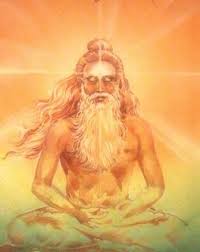Great Throughts Treasury
This site is dedicated to the memory of Dr. Alan William Smolowe who gave birth to the creation of this database.

Patañjali NULL
Indian Philosopher and Compiler of Yoga Sūtras and the Mahābhāṣya, Patañjali is a Sanskrit proper name. Several important Sanskrit works are ascribed to one or more authors of this name, and a great deal of scholarship has been devoted over the last century or so to the issue of disambiguation
"Kaivalya is attained when there is equality of purity between the Purusa and Sattva."
"Its flow becomes tranquil by repeated impression."
"Kaivalya is the state (of Enlightenment) following re-emergence of the Gunas because of their becoming devoid of the object of the Purusa. In this state the Purusa is established in his Real nature which is pure Consciousness."
"Karmas are neither white nor black (neither good nor bad) in the case of Yogis, they are of three kinds in the case of others."
"Karma is of two kinds: active and dormant; by performing Samyama on them (is gained) knowledge of the time of death; also by (performing Samyama on) portents."
"Knowledge of its own nature through self-cognition (is obtained) when consciousness assumes that form in which it does not pass from place to place."
"Knowledge of the small, the hidden of the distant by directing the light of super-physical faculty."
"Knowledge of the Solar System by performing Samyama on the Sun."
"Karmasaya or latent impression of action based on afflictions, becomes active in this life or in a life to come."
"Kindness in words creates confidence. Kindness in thinking creates profoundness. Kindness in giving creates love."
"Knowledge of everything from intuition."
"Knowledge born of awareness of Reality by performing Samyama on moment and (the process of) its succession."
"Knowledge born of the finest discrimination takes us to the farthest shore. It is intuitive, omniscient, and beyond all divisions of time and space."
"Kriya Yoga consists of body discipline, mental control, and meditating on Aum."
"Kriya-Yoga is practiced for attenuating Klesas and bringing about Samadhi."
"Last three parts of Yoga are contemplation, meditation and reconciliation. These are all internal means. Contemplation involves concentration of conscience around navel, tip of the nose or heart. Alternatively, a practitioner may practice contemplation by concentrating his conscience externally at an idol of God."
"Liberation can be attained by that pranayama which is accomplished by disjoining the course of inspiration and expiration."
"Liberation of the seer is the result of the disassociation of the seer and the seen, with the disappearance of ignorance."
"Mastery over the elements arises when their gross and subtle forms, as well as their essential characteristics, and the inherent attributes and experiences they produce, is examined in self-control."
"Liberation is attained when there is equal purity between vitality and the indweller."
"Mastery over the sense-organs by performing Samyama on their power of cognition, real nature, egoism, all-pervasiveness and functions."
"Mastery over the Pa¤ca-Bhutas by performing Samyama on their gross, constant, subtle, all-pervading and functional states."
"Memory is not allowing an object which has been experienced to escape."
"Mental pain, despair, nervousness and hard breathing are the symptoms of a distracted condition of mind."
"Memory is not allowing mental impressions to escape."
"Miseries which are yet to come could be avoided."
"Moreover, it is impossible for it to be of both ways (as perceiver and perceived) at the same time."
"Most of us assume that human beings have free will. However... [we] are very much conditioned by our species, culture, family, and by the past in general... It is rare for a human being to have free will."
"Nirodha Parinama is that transformation of the mind in which it becomes progressively permeated by that condition of Nirodha which intervenes momentarily between an impression which is disappearing and the impression which is taking its place."
"Non-possessiveness being confirmed there arises knowledge of the `how' and `wherefore' of existence."
"Nor is an object dependent on one mind. What would become of it when not cognized by that mind?"
"Nor is the mind self-luminous, as it can be known."
"Not being conditioned by time, God is the teacher of even the ancients."
"Nor is it self-illuminative, for it is perceptible."
"Of these the mind born of meditation is free from impressions."
"Of these, the mind born of concentrated insight is free from the impressions."
"Now, an exposition of Yoga (is to be made). Yoga is the inhibition of the modifications of the mind."
"Now, instruction in Union."
"On attaining perfection in non-acceptance, a thorough illumination of the how and why of one?s birth comes."
"On attaining the utmost purity of the Nirvicara stage (of Samadhi) there is the dawning of the spiritual light."
"On attaining the purity of the ultra-meditative state there is the pure flow of spiritual consciousness."
"On being firmly established in honesty all kinds of gems present themselves (before the Yogi)."
"On being firmly established in truthfulness fruit (of action) rests on action (of the Yogi) only."
"On being firmly established in sexual continence vigor (is) gained."
"On suppression of even that owing to suppression of all (modifications of the mind), `Seedless' Samadhi (is attained)."
"On the destruction of impurity by the sustained practice of the limbs of Union, the light of knowledge reveals the faculty of discrimination."
"Once trained, the practitioner does not have an awareness of his surroundings. But, during mundane interactions, this awareness is regenerated for practical purposes."
"On the clarification of memory, when the mind loses its essential nature (subjectivity), as it were, and the real knowledge of the object alone shines (through the mind) Nirvitarka Samadhi is attained."
"Only from the awareness of the distinction between Sattva and Purusa arise supremacy over all states and forms of existence (omnipotence) and knowledge of everything (omniscience)."
"One-pointedness is steadfastness of the mind."